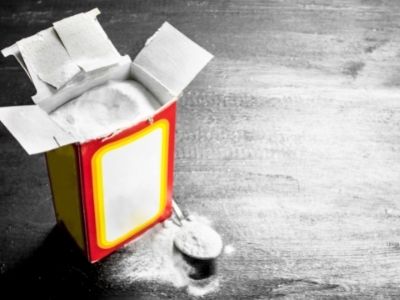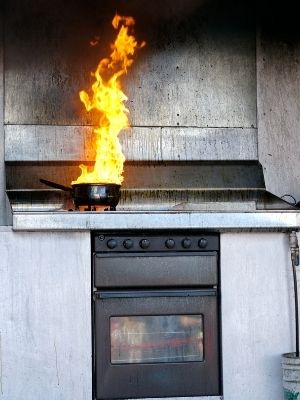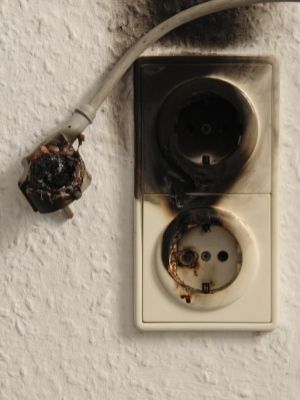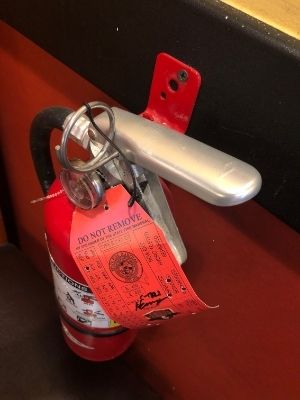Baking soda, or bicarbonate of soda, is one of those wonderful substances that no home should be without. It is great for baking and part of some brilliant hacks for cleaning. You may have also heard that baking soda is a great fire extinguisher. Just how effective is baking soda and should you consider using it in an emergency?

Baking soda can be a helpful agent for controlling some types of fire. In fact, it isn’t uncommon to see forms of bicarbonate of soda in fire extinguishers. However, you need to be careful when using it and there is no guarantee that baking soda alone will completely extinguish a fire.
When talking about the potential of baking soda for firefighting, we need to understand a few important factors. They include,
- The relationship between baking soda and bicarbonate of soda
- Why bicarbonate of soda is so effective when dealing with fires
- The types of fires you can use bicarbonate of soda for
- How bicarbonate of soda is used in fire equipment
- How baking soda compares with other ingredients in your kitchen
Table of Contents
Baking soda or bicarbonate of soda?
First of all, we need to clarify the relationship between bicarbonate of soda and baking soda. These two substances are the same thing, with bicarbonate of soda being the more scientific ingredient name and baking soda the product.
We simply call it baking soda because that it is a sodium substance used in baking. Whichever of the two it says on the label, you can use it as a fire extinguisher.
The confusion comes when we get to baking powder, as you will see below.
Why is bicarbonate of soda so effective?
The efficiency of baking soda is all down to chemistry and chemical reactions. Sodium bicarbonate reacts with heat to become sodium carbonate.
You need a pretty high temperature of more than 518 degrees Fahrenheit to create this reaction. This should happen easily when in contact with flames.
This process leads to the release of both water and carbon dioxide. Carbon dioxide is the crucial element here as it removes oxygen from the fire. With oxygen to burn, the fire will die out and you can keep the blaze under control.
Therefore, directly applying baking soda to a fire provides an instant chemical reaction where the powder smothers the flames and creates changes in the ratio of carbon dioxide to oxygen in the immediate atmosphere.
This can prove to be effective in small-scale fires where you can dump enough of the powder onto the fire.
Can you use bicarbonate of soda on kitchen fires?
One situation where you can make use of baking soda for fires is a kitchen fire. Kitchen fires can occur when grease or oil catches alight.

Deep fat fryers are a big fire hazard but there are also incidents with hot oil on stovetops. When this happens, refrain from throwing any water at the fire because this will cause the oil to spit and possibly send more flames into the air.
This then increases the risk of burns and fire damage. Instead, what you need to do is smother the flames to remove the oxygen.
There are a couple of ways that you can do this depending on the intensity of the fire. The first option is to get your container of baking soda and dump it over the flames.
The more you use the better the impact. This could cause such a quick response with the generation of carbon dioxide in the heat of the flames that the oxygen depletes rapidly enough for the fire to go out.
Or it could control the fire enough for you to get a cover for the pan. Covering a pan fire is a brilliant way to stop the fire as there is a physical barrier stopping more oxygen from getting to the flames.
A pan lid is ideal but a baking sheet could also work.
Can you use baking soda on electrical fires?
Baking soda is also a great option for any small electrical fires because this is another situation where reaching for a bottle of water is a bad idea.
You may be less likely to have baking soda to hand if a device catches fire in a living room or bedroom, but as long as there is always some in the same place in the kitchen you should be OK. The same rules apply here.

All you need to do is dump the powder over the device and it should be enough to put out the flames.
Where possible, it is also a good idea to turn off the power to the outlet or device to minimize any further risk of damage.
You may find that it is safe to do so at the main outlet if the fire is contained within the appliance or electrical device itself – for example, if there is an overheated battery. But, this may not be possible if the issue is with the cord or outlet.
You could also try turning off the power to the outlet via the breaker. If the fire is too intense for baking soda alone then you will need to smother it with a piece of clothing or blanket, or better yet use a Class C fire extinguisher.
Using fire extinguishers that contain sodium bicarbonate.
You may be aware that there are different types of fire extinguishers with substances to handle specific types of fire.
But, did you know that the Class C fire extinguishers actually contain sodium bicarbonate as one of their effective agents?
These devices use a mixture of sodium bicarbonate, monoammonium phosphate, potassium bicarbonate, or potassium chloride for the same effect.
These extinguishers are best used on fires involving energized electrical equipment.
Therefore, if you are in a building with a lot of computerized or electrical equipment, it is a good idea to have these extinguishers readily available in case of a fire.
Never forget that water and electricity don’t mix so you can’t try putting out an electrical fire on a live appliance or outlet with water.
These Class C fire extinguishers with sodium bicarbonate are not, however, recommended for kitchen fires such as grease fires. In these situations where baking soda and suppression aren’t enough, you will need to turn to a Class B dry chemical extinguisher or a fire blanket.

These should be accessible in any commercial kitchen.
If you cannot access an appropriate fire extinguisher for a kitchen or electrical fire, feel that the fire is too far out of hand, or simply aren’t confident enough about handling the situation, leave it to the professionals.
Get everyone out, close the doors, and call 911.
It is better to use bicarbonate of soda than salt?
You may have also heard that salt is a great agent for fighting fires and a helpful alternative to bicarbonate of soda.
There are some clear benefits in choosing bicarbonate of soda because of the impact of the substance on the flame and the potential for dealing with a range of different fires.
However, you may also find that you get a better result with salt when dealing with kitchen fires. You don’t need a lot of salt to keep a grease fire under better control and you can use any basic table salt in your kitchen cupboard.
The best thing that you can do for fire safety in your kitchen is to have both at hand so you can pick the best option depending on the source of the fire. Click the link to learn more about using salt and saltwater in firefighting in my other guide.
Can you use baking powder instead of bicarbonate of soda?
This is an important point that is sometimes overlooked. It is very easy to confuse baking soda with baking powder.
They may be in similar containers in the same kitchen cupboard. You may accidentally refer to them by the wrong name. That becomes a problem when considering using bicarbonate of soda to put out fires.
Baking powder is not safe to use because it is much more volatile when in contact with the flames. Sprinkling baking powder on a fire could lead to small explosions that worsen the fire and create a bigger health and safety risk.
It is also crucial to remember that there is a similar effect with flour, so don’t use that either.
If you have any doubts, call 911 and wait for the fire department to arrive.
There is great potential in using bicarbonate of soda to control small fires in your home. You may be able to extinguish small electrical fires before they get out of control or tame a grease fire so it doesn’t spread too far.
But, there is nothing wrong with just vacating the property and waiting for professional help if you aren’t confident in trying out bicarbonate of soda. Keep some on hand in case of emergencies, but always call the fire service for help.